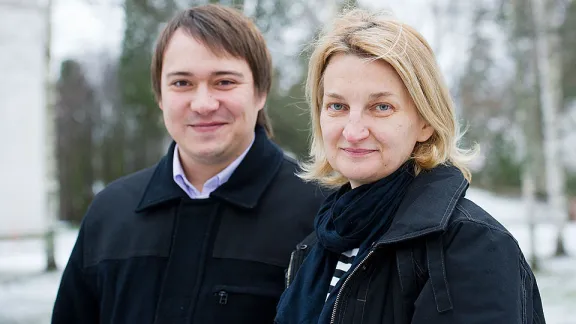
(l to r) Rev. Vladislav Iviciak, Marija Parnicki, both Slovak Evangelical Church of the Augsburg Confession in Serbia © LWF/Juho Kuva
IFAPA President Noko Says Crisis Can Be Prevented
Representatives of a Pan-African grouping of faith leaders say the mineral resource-based conflict in the Democratic Republic of Congo (DRC) could be prevented if signatories to peace agreements honored their stated commitments.
Key leaders of the Inter-Faith Action for Peace in Africa (IFAPA) also appealed to the continent’s religious leaders to urgently engage political leadership in the DRC and neighboring countries to end a crisis for which civilians continued to suffer the greatest atrocities.
“Are we not moved by the inhuman conditions of those [internally displaced] mothers and children? Is it not correct to say that while this war is raving, the mineral resources are being taken out of the country for the benefit of others other than the citizens of the DRC?” remarked IFAPA president and general secretary of the Lutheran World Federation (LWF), Rev. Dr Ishmael Noko, in his keynote address to the third IFAPA Commission meeting, taking place, 10-13 November, in Entebbe, near the Ugandan capital Kampala. Established in 2002, IFAPA comprises representatives of Africa’s seven main faith traditions.
In the past few weeks, fighting has intensified between government soldiers and rebels allied to dissident general Laurent Nkunda in the mineral-rich eastern DRC region, especially North and South Kivu, with relief agencies reporting massive displacement of civilians. Nearly 200,000 people, according to United Nations’ relief agency reports, are receiving emergency assistance near the city of Goma, while an unknown number is said to be cut off in the nearby forest.
Noko urged fellow religious leaders “to have the courage and take leadership” in meeting with leaders of the parties in the DRC conflict “for the sake of our children and their future.” He emphasized decisive action was urgently needed “for unless we do so, war and conflict are gradually becoming part of the DNA [intrinsic characteristic]” of politics in Africa. “Will we allow that transformation to become complete?” he asked the commission members.
“This is not a political problem. It is resource-based conflict on who occupies vital points. Some people are looking for key geographical area,” said IFAPA Commission member Rev. Gilbert Boissa, president of the National Inter-Religious Forum in the DRC. He noted that peace agreements, especially the December 2006 pact on security, stability and development signed in Nairobi, Kenya, had been broken, giving groups reasons to resume fighting.
According to the UN High Commissioner for Refugees, the fighting in eastern DRC has displaced an estimated one million people since 2006, with various clashes pushing more than 300,000 Congolese to neighboring countries, while the DRC itself hosts almost 300,000 refugees who have fled war in neighboring countries.
“New groups are emerging in the district of Ituri. It also indicates the presence of foreign armed groups who continue to compete with the national army on several fronts, attacking defenseless civilians,” said Boissa.
“Sexual abuse and forced recruitment of children into armed groups are reported in areas of conflict. Rape continues to be used as weapon of war. Many women are subjected to attack,” noted Boissa.
He said the DRC IFAPA network was working with other faith-based organizations in advocating the protection of civilians, reuniting families and lobbying for peace and the peaceful delivery of humanitarian aid.
Boissa urged the IFAPA Commission to agree on a special committee to look into the DRC issues, including the convening of a peace conference to help the Great Lakes region heads of state to revisit the Nairobi peace pact. He proposed the establishment of an interfaith observatory mechanism which could monitor, control and audit the regional situation.
“It is in the implementation where the problem is. The pacts get blocked,” added the DRC religious leader.
The LWF is present in the Central African country through its member church, the Evangelical Lutheran Church in Congo, and the Department for World Service country program for Rwanda and DRC.
(By Nairobi-based LWI correspondent Fredrick Nzwili)


